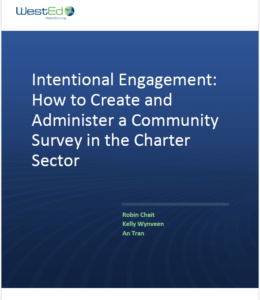Intentional Engagement: How to Create and Administer a Community Survey in the Charter Sector
For California charter school petitioners and leaders, it is not just sound planning to first consider if the school will be a good fit for the local community, it is also the law. Under AB 1505, initial charter petitions, renewals, appeals, and expansions must show how the school will “serve the interests of the entire community in which the school is proposing to locate.”
WestEd’s comprehensive guide to conducting community surveys covers:
- Essential questions for charter organizers to answer before developing the survey to ensure that it “aligns with your goals,”
- Skills and expertise to look for in “assembling a team to design and administer” the survey,
- How to identify the target population for the survey,
- Outreach strategies to increase response rates,
- Best practices and people to analyze the responses, and
- How to communicate and use the results.
CCAP and WestEd are developing a supplement for our authorizer toolkit on new school petitions on how to assess whether charter school petitions meet California’s new community interest requirement.
Under AB 1505, initial charter petitions, renewals, appeals, and expansions must show how the school will “serve the interests of the entire community in which the school is proposing to locate.”
Over the past few months, CCAP and WestEd have been holding discussions with authorizers to gather information on questions and challenges raised by these new provisions. The toolkit supplement will provide guidance to authorizers on how to evaluate petitions and work with schools and community stakeholders to ensure that they understand the process for identifying and meeting community needs. These include:
- Identification of the Community
- Description of Community Engagement and Demonstrated Need
- Assessment of Duplication of Services, Academic Offerings, and Programmatic Offerings
- Facilities
- Additional Information
- District Assessment of Fiscal Impact
If you’re an authorizer and would like more information about this work, please contact CCAP Executive Director Tom Hutton at tom.hutton@calauthorizers.org.

State: California
Document Type:
Major Area(s) of Work:
Lifecycle Phase: All Lifecycle Phases
School Type: All School Types
Document Format: pdf
Number of Pages: 25
Language: English
Publication Date:
Version: Final
Status:

